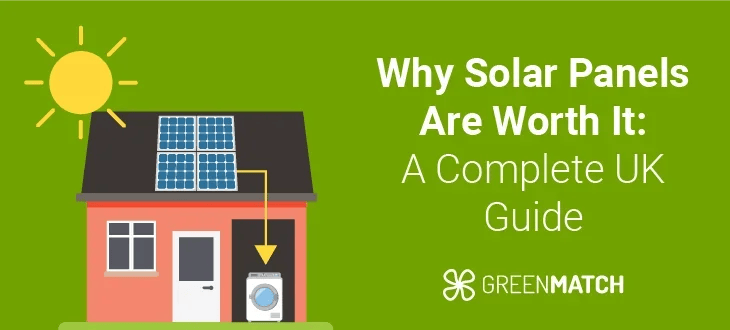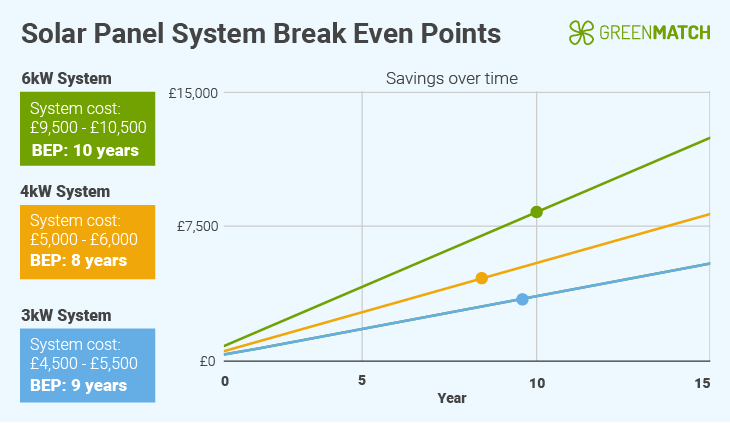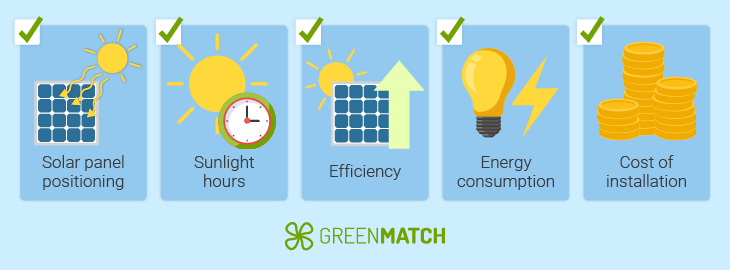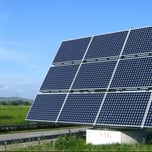Answer these simple questions and we will find you the BEST prices
Which type of solar quotes do you need?
It only takes 30 seconds
100% free with no obligation

Get up to 4 quotes by filling in only 1 quick form

Slash your energy bills by installing solar panels

For the average 2-3 bedroom house
- GreenMatch
- Blog
- Are Solar Panels Worth It
Are Solar Panels Worth It in the UK? October 2025 Guide


- Yes, solar panels are worth it! The average 2-3 bedroom UK home hooked up to a 4kW PV system can save you £1,304 per year and pay back in 6 years.
- A 2-3 bedroom house typically requires a 4kW solar panel system, which costs £6,600 - £8,100 on average.
- Solar panels are subject to a 0% VAT policy until 2027, which reduces combined solar panel system costs by up to £2,850 (compared to 20% VAT).
If you find yourself asking: “Are solar panels worth it?” the answer is yes. Installing solar panels is worth the effort because you become less reliant on the national grid, energy costs are lower (saving you up to £1,567 per year), and you cut your carbon footprint (by almost a tonne) in pollution for the average solar panel system.
| Household size | System size | System cost + installation | Annual savings | Break-even period | Savings after 25 years |
|---|---|---|---|---|---|
| Small; 1-2 bedrooms | 2kW | £3,800 - £4,600 | £783 | 7 | £19,578 |
| 3kW | £5,700 - £7,000 | 7 | |||
| Medium; 2-3 bedrooms | 4kW | £6,600 - £8,100 | £1,304 | 6 | £32,608 |
| 5kW | £8,300 - £10,200 | 6 | |||
| Large; 4-5 bedrooms | 6kW | £10,000 - £12,200 | £1,567 | 6 | £39,163 |
To help you get started, we can connect you with top solar panel installers in the UK who can provide up to 4 free non-comment quotes. You’ll be able to compare prices, warranties and installation services in one go, saving you hours of research and contacting companies individually. Fill in the 30-second form below.
- Quotes from local engineers
- Payment by finance available
- Save up to £1,567 per year
It only takes 30 seconds



- How much do solar panels cost?
- How much can solar panels save?
- Reduce the cost of solar panels with solar grants in the UK
- Solar panel return on investment & break-even point
- What affects solar panel payback time?
- Pros and cons of getting solar panels
- Are solar batteries worth it?
- Do solar panels increase the value of my home?
- Should you get solar panels for your home?
- FAQ
How much do solar panels cost?
The 2025 solar panels cost in the UK ranges £6,600 - £8,100 for an average 4kW system. This size can cover the average 2,700kWh energy consumption that applies to most 2 to 3-bedroom houses.
The table below outlines the yearly energy output per system size and their estimated costs.
| Household size | System Size | Solar Panels Needed (450W) | Yearly Energy Output | Estimated Costs Inc. Installation |
|---|---|---|---|---|
| Small; 1-2 bedrooms | 3 kW solar system | 6 | 2,550 kWh | £5,700 - £7,000 |
| Medium; 2-3 bedrooms | 4 kW solar system | 8 | 3,400 kWh | £6,600 - £8,100 |
| Medium; 2-3 bedrooms | 5 kW solar system | 10 | 4,250 kWh | £8,300 - £10,200 |
| Large; 2-3 bedrooms |
6 kW solar system | 13 | 5,100 kWh | £10,000 - £12,200 |
Estimate potential solar panel costs and savings based on your location using our solar panel cost calculator.
In the following sections, we'll look at some ways you can reduce the costs of these solar panels and save money once they are installed.
PV is a long-term capital asset and should be treated like an investment.Consumers may hesitate at a high payback time (break-even point). They should, however, take the next step and calculate the return on investment. Solar panels will easily last 25 years, and your economic considerations should go that long. When you do this – in most cases, solar will provide you with a higher ROI than you are currently getting on your other investments (and certainly from anything you are earning on your savings account at the bank).

Joshua M. Pearce is the John M. Thompson Chair in Information Technology and Innovation. He holds appointments at Ivey Business School and the Department of Electrical & Computer Engineering at Western University. He runs the Free Appropriate Sustainability Technology research group.
Do solar panels save money?
Yes, solar panels do save money, and the size of the system determines how much you’ll save. For instance, a 3kW system powering a 1-2 bedroom home can save up to £783 per year on electricity bills. The bigger the system, the greater the savings.
Further, you can even earn money by selling extra solar energy back to the grid through the Smart Export Guarantee (SEG) scheme. Instead of just using free electricity, SEG pays you for every unit of surplus energy you export. This can bring the annual savings of a 2-3 bedroom home to £1,141, but it depends on how much energy you use and the tariff rates.
| System Size | Annual savings on utility bills | Annual savings with SEG payments |
|---|---|---|
| 2 - 3 kW system | £783 | £887 |
| 4 - 5 kW system | £1,304 | £1,141 - £1,518 |
| 6 kW system | £1,567 | £1,705 |
*These figures are calculated using 450W panels and 2025 Ofgem's average household energy consumption in the UK.
How much money you can save depends on how and when you use the electricity that your solar panels produce. Running your appliances during the day can increase your savings because you’re using the power directly from your panels.
However, at night, you’ll still need electricity from the national grid to power your nighttime appliances. Unless you have a solar battery, which stores extra energy for later use. If you’re considering a complete solar energy system with battery storage, choosing the right installer is key to getting the best deal.
But, comparing solar panel packages, warranties, and installation costs requires hours of research. Skip contacting numerous companies and get up to 4 free, non-commitment quotes from our network of accredited UK suppliers by using the 30-second form below.
- Quotes from local engineers
- Payment by finance available
- Save up to £1,567 per year
It only takes 30 seconds



Reduce the cost of solar panels with solar grants in the UK
For many, the idea of switching to solar panels is exciting, but the upfront cost can be off-putting.
The good news is solar grants in the UK can help lower the cost and make switching to solar more affordable and accessible, supporting greater energy independence.
Some solar panel grants fully cover installations for eligible households, while others lower costs through 0% tax or energy buyback schemes.
Below we give an overview of the solar grants available to UK households.
| UK Solar Grants | Potential savings | Who can apply |
|---|---|---|
| 0% VAT | 20% savings on solar panel systems until 2027 | All UK buyers |
| Smart Export Guarantee (SEG) | Up to £1,141 yearly savings from 4kW system | Solar panel owners with a smart meter |
| Energy Company Obligation 4 (ECO4) | Up to 100% on solar installation until 2026 | All UK low-income households |
| Warm Homes Local Grant | Up to 100% for solar panels, insulation & heat pump until 2028 | Low-income households in England with EPC D-G* |
| Warm Homes Nest Scheme | Up to 100% for solar panel fittings (ongoing) | Homeowners in Wales |
| Home Energy Scotland Grant and Loan | £7,500 grant + optional loans for solar thermal & hybrid solar PV/water heating until 2026 | Scottish homeowners |
*Available solar panel grants in the UK as of {thisyear-thismonth} | *Energy Performance Certificate (EPC) rating.
- Energy Company Obligation 4 (ECO4): Covers up to 100% of solar panel installation costs (until 2026) for low-income households (under £31,000 annual income) or persons receiving government benefits. Homes must also have a low Energy Performance Certificate (EPC) rating of D, E, F or G to qualify.
- 0% VAT: Solar panels were initially 20%, later reduced to 5% and now are tax-free until 31 March 2027, which will go back to 5%.
- Smart Export Guarantee (SEG): You can sell any extra solar energy produced back to the grid via the SEG smart metering. A 4kW system could save up to £1,141 per year.
- Warm Homes Local Grants: 100% funded solar panels, insulation, and heat pumps for low-income households (under £36,000/year) in England (EPC rating D-G) until 2028.
- Warm Homes Nest Scheme: Covers 100% of the funding for solar panel installations for Welsh homeowners, private renters, low-income households, and those on benefits. The grant period is ongoing.
- Home Energy Scotland Grant and Loan: Offers up to £7,500 in grant funding plus an optional loan for solar thermal and hybrid solar PV/water heating systems until 2026. You must meet the low-income threshold (below £36,000) or live in the most economically deprived areas (IMD 1-3). Also, your home must have a low EPC D-G rating or be built in a rural area with no heat from the main gas (including oil, coal, LPG, or electric heating). Standard solar PV panels for electricity are not covered by this grant.
If you qualify for any of the grant schemes, you could save thousands on installation. So, are solar panels worth it in the UK? Undoubtedly, yes!
Solar panel return on investment & break-even point
The break-even point for the average domestic solar panel system (4kW - 5kW) is around 8 years, less than half of the typical system lifespan. In 25 years, you can expect to save up to £32,608, with an average payback amount of £19,000 - £21,000.
Below, you can find an overview of the savings you can expect with different solar system sizes, how long it takes to reach the break-even point and when you can expect a return on your investment.
| Household size | Solar system size | System costs | Annual savings | Break-even point | Return on investment |
|---|---|---|---|---|---|
| 1 – 2 bedrooms | 3kW | £4,500 - £5,500 | £783 | 7 years | £13,000 - £15,000 |
| 2 – 3 bedrooms | 4kW | £5,000 - £6,000 | £1,304 | 6 years | £19,000 - £21,000 |
| 4 – 5 bedrooms | 6kW | £9,500 - £10,500 | £1,567 | 6 years | £29,000 - £31,000 |

- Quotes from local engineers
- Payment by finance available
- Save up to £1,567 per year
It only takes 30 seconds



What affects solar panel payback time?
Solar panel position, sunlight hours, efficiency, energy consumption, and the cost of solar installation all affect the payback period for solar panels. Payback periods can take around 6 years on average, depending on the following factors:

- Solar panel positioning: Optimal solar system output can depend on positioning and whether your panels are angled properly. In the UK, the ideal angle for solar panels is between 30° and 40° on a south-facing section of your roof.
- Sunlight hours: The UK has about 4 to 5 peak hours of sunlight per day, which can require more powerful systems. In some areas, like the north of Scotland, you may have a larger payback period since you may need either a more expensive solar system or it will take longer to generate the same amount of energy as in other areas.
- Solar panel efficiency: The best solar panels tend to be over 20% efficient at least, in the UK and worldwide. Monocrystalline panels are the best for domestic solar panels in this regard. Higher efficiency will mean better energy generation per hour.
- Home energy consumption: How much energy you consume will also impact the time it takes to recoup your investment. Most homes in the UK consume 2,700kWh per year, but since this is an average, some can consume more or less.
- Cost of solar installation: The cost of your solar energy setup will probably be between £5,000 - £6,000 if you live in a 3-bedroom home. However, larger solar panels, more expensive installation processes, and special types of panels (like integrated solar panels or solar roof tiles) can all cost more. These added costs can extend the time it takes to break even on your investment.
- Quotes from local engineers
- Payment by finance available
- Save up to £1,567 per year
It only takes 30 seconds



Pros and cons of getting solar panels
If you’re wondering, “Is going solar worth it?” it's important to understand the advantages and disadvantages of solar panels. The benefits outweigh the drawbacks, let’s look at why:
- Lower your electricity bills: With solar panels, you can enjoy free green energy, meaning that you can avoid overspending on your yearly energy bills. Depending on use, you may save between £783 and £1,567 a year when you rely on solar panel energy production.
- Earn money back: With a Smart Export Guarantee (SEG) tariff, you can sell any excess energy produced by your solar panels back to the grid and receive payments per kilowatt/hour (kWh) transferred. This way, you can earn up to £75 per year.
- Reduce reliance on the grid: Solar panels allow you to significantly lower your dependence on the electricity grid, especially if your PV system is paired with a solar battery. This protects you from fluctuating energy costs and allows you to support your own energy needs.
- Require low maintenance: Once installed, solar panels require little to no maintenance to operate efficiently. All you need to do is ensure that they have no damage and that their surface is clear of any debris.
- Reduce your carbon footprint: Solar panels can reduce reliance on fossil fuels for electricity. An average 3-bedroom home can cut up to one tonne of carbon emissions per year.
- High initial cost: Installing solar panels is far from cheap. Both their supply and installation costs are quite high, so make sure to check whether they are a financially viable option for you.
- Potential placement issues: While most roofs are suitable, some roof types, angles, and orientations might not be viable for solar panel installation. The best direction for solar panels in the UK is southward, while the optimal angle is between 30° and 40°. So, make sure to consult a specialist who can assess your roof space and suitability. Installing flat roof solar panels is possible but requires adjustable ballasts, which can add around 25% to the fitting costs.
- Varying efficiency levels: While solar panels don’t need direct sunlight to operate, they are still the most efficient during the day, especially integrated solar panels. As a result, you may need to use grid electricity when it’s dark out unless you pair your system with a solar battery to store excess power.
Are solar batteries worth it?
Are solar batteries worth it? Well, if your household uses a lot of electricity each year, adding a solar battery to your solar system may be worth it in the long run. This is because, with solar panels, you can only use the energy they generate right away. However, solar batteries let you store extra electricity to use at night or in blackouts.In terms of costs, these vary with different solar battery sizes. Below is an overview of the estimated costs of solar batteries, as well as the average savings they can bring through the Smart Export Guarantee (SEG):
| Household size | Solar battery size | Estimated solar battery cost | Average annual SEG savings | Estimated annual savings solar panels + battery |
|---|---|---|---|---|
| 1 - 2 bedrooms | 4 - 7kWh | £3,500 – £8,000 | £80 | £887 |
| 2 - 3 bedrooms | 9 - 12kWh | £8,000 – £9,500 | £75 - £170 | £1,141 - £1,518 |
| 4 - 5 bedrooms | 13 - 14kWh | £9,000 – £10,000+ | £108 | £1,705 |
SEG savings are calculated based on an average tariff rate of 10.8p/kWh and the estimated annual surplus electricity generated for each house size.
For a comprehensive list of tariff rates and potential savings, see our Best SEG Tariff page.
As you can see, solar batteries are costly. Be sure to calculate these prices for your solar system installation costs. Then, ask yourself: “Are solar panels a good investment?” and "Are solar batteries worth it in the UK?"
If you need more help answering these questions, consult a solar panel installer. We can help by connecting you with our network of solar panel suppliers across the UK. Fill in the form below to receive up to 4 free non-binding quotes, saving you hours of research and the hassle of contacting various companies individually.
- Quotes from local engineers
- Payment by finance available
- Save up to £1,567 per year
It only takes 30 seconds



Do solar panels increase the value of my home?
While evaluating if solar panels increase home value, an important factor to consider is their impact on UK property prices. According to a 2024 study published in Energy Economics, homes with solar panels sell for 3.5% to 7.1% more than those without. With an average home price of £268,000, this could mean an extra £9,380 to £19,000 in value.
A report by Solar Energy UK also found that the impact varies by region, with some areas having higher returns than others. Homes with solar panels are more attractive to buyers because of lower energy costs and reduced carbon footprint.
So, if you’re still asking yourself, “Should I get solar panels?” then it is worth considering not only the extra cash you can get if you intend to sell your property in the future but also the impact on energy bill savings.
Should you get solar panels for your home?
Yes, it's worth the effort to get solar panels installed to power your home. They can cut your electricity bills by £783 and £1,567 per year, depending on how much energy you use and the size of your system. At the same time, they generate free electricity once installed and you can earn your money back relatively quickly after investing in solar panels, around 8 years on average.
Solar panels can save your electricity bills significantly while covering your household’s energy needs. The return on investment on solar installations can range from £10,500 - £11,500 for the average 2-3 bedroom household, as they operate for 25 years.
Additionally, solar panels allow you to reduce your carbon footprint by using the sun's power to generate electricity.
If you’re ready to switch to solar energy now or looking for accurate prices, we can connect you with our network of accredited solar panel suppliers and installers saving you endless hours of researching on your own.
- Quotes from local engineers
- Payment by finance available
- Save up to £1,567 per year
It only takes 30 seconds



FAQ
Yes! Generating your own renewable electricity allows you to charge your vehicle at a much lower cost compared to public chargers or grid electricity.
Yes, solar panels are worth it in the UK. There are several advantages to installing solar panels, the main ones being that they can generate energy year-round and reduce an average household’s yearly electricity bills by up to £1,304.
Yes. By installing solar panels in Scotland, you can cut down heating bills by £783 to £1,567. While the initial costs can seem high, incentives like Home Energy Scotland can make it easier to pay for solar panels.
The standard 4kW solar panel system costs between £6,600 - £8,100, allowing for annual savings up to £1,304. However, savings can vary based on external factors.
Compare your energy needs, the price of the system, annual savings, and payback period against each other. Keep in mind that certain factors (e.g., sunlight hours) may increase or decrease your savings.

Sabria Schouten is a content writer who aims to make information about sustainable energy broadly available. She believes that knowledge about how to lead a greener lifestyle should be easily accessible to anyone.

We strive to connect our customers with the right product and supplier. Would you like to be part of GreenMatch?

- Are Solar Panels Worth It in the UK? Complete 2025 Guide
- How much do solar panels cost?
- How much can solar panels save?
- Reduce the cost of solar panels with solar grants in the UK
- Solar panel return on investment & break-even point
- What affects solar panel payback time?
- Pros and cons of getting solar panels
- Are solar batteries worth it?
- Do solar panels increase the value of my home?
- Should you get solar panels for your home?
- FAQ
- Quotes from local engineers
- Payment by finance available
- Save up to £1,567 per year
It only takes 30 seconds







